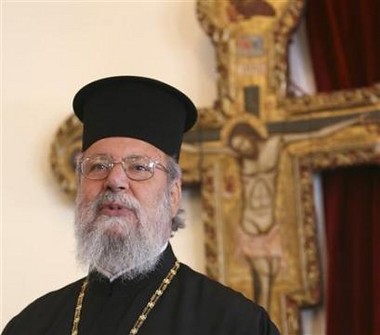Middle East Churches Need To Work Together For Peace – Archbishop
22/2/2011
Churches in the Middle East must work together to overcome the problems facing the region in order that “peace can prevail,” Archbishop Chrysostomos of Cyprus said in an address on 18 February at an extraordinary meeting in Cyprus of the Executive Committee of the Middle East Council of Churches.
“We believe strongly that the time has come for all of us — all the churches of the Middle East — to join forces and work consciously towards a solution of the many serious problems that exist in our region, and above all so that peace can prevail in our countries and among our peoples, far from religious fanaticism and bigotry,” the archbishop told the gathering.
However, he noted, in order to be effective the MECC must overcome its own internal disagreements and he reiterated his proposal that the Church of Cyprus undertake the secretariat support of the council’s offices.
“As can be easily understood, in order for us, the Middle East Council of Churches, to be able to exercise our role and make an active and fruitful contribution to the desired objective of establishing a better and happier world in our region, without wars and bloodshed, we must focus with Christian love and in a spirit of good will and mutual understanding, on the task of examining the problems we are facing, in order to give answers and achieve solutions,” he said.
All four church groups — including the Eastern Orthodox, Oriental Orthodox, Catholic and Evangelical churches — were represented by their presidents and five additional representatives from each church. One of the objectives of the meeting was to prepare for the general assembly scheduled to take place in Cyprus in August.
Some representatives from churches in Egypt were unable to attend because of the political situation in their country, said the Rev. Munib A. Younan, Bishop of the Evangelical Lutheran Church in Jordan and the Holy Land, and president of the Evangelical family of churches.
The current situation in the Middle East was discussed at the executive committee meeting, said Younan in a telephone interview on 21 February.
“We are all for political and economic reforms but at the same time our message is very clear that we have to let the grassroots (movements) who are supporting (the protests) know they should always be moderate, promote human rights, freedom of religion and speech,” he said. “We hear the cries of the people and we tell the people to use their sanity and not only their frustrations, (in order to build) a moderate civil society.”
He added that the Cyprus meeting had served to “strengthen and re-invigorate” the unity amongst the MECC member churches despite any “moments of disagreements.”
“Ecumenalism is always in our discussions, seeing how we can improve our unity in a situation we are living in with such political upheaval, in a situation where extremism and fanaticism is growing in the whole Middle East including our country,” said Younan.
Christians are an integral part of Middle Eastern societies, he added, and so far the demonstrations in the region have not been against any religious groups but have remained protests against authoritarian political regimes. “We are still monitoring and watching what is happening,” he said.
In his address, Chrysostomos also noted that the executive committee meeting was taking place during “critical times for the region.” In particular, he noted “the regrettable phenomena of the rise of religious fanaticism and the serious violation of religious freedoms.” He said that in the northern part of Turkish-occupied Cyprus, Turkish security officials are preventing priests from carrying out their religious duties.


689518 795986The electronic cigarette makes use of a battery and a small heating aspect the vaporize the e-liquid. This vapor can then be inhaled and exhaled 382567